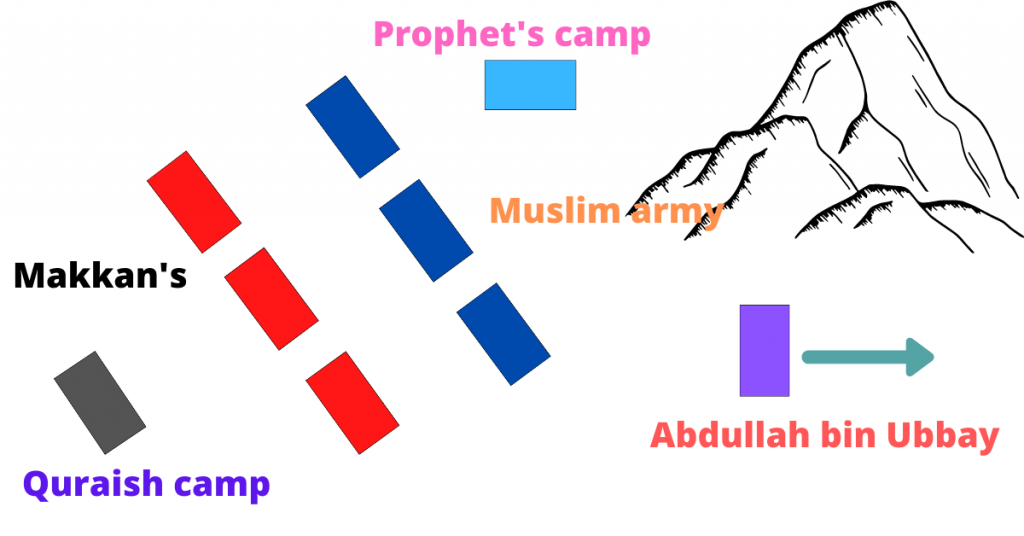The battle of Uhud was a very important conflict between the Quraish of Makkah and the Muslims of Madinah.
This battle was fought on 3 A.H (one year after the battle of Badr) and therefore, it has some connection to it. This was the second major battle fought by the Prophet Muhammad (PBUH) after his migration to Madinah.

The battle of Uhud has a background, some important events and its significance to the Muslims. So let’s start from the very beginning.
The Background:
- The Battle of Badr in 2 A.H was a conflict in which the Muslims inflicted a humiliating defeat to Abu Sufiyan and his force.
70 important Makkan people were killed during the battle of Badr while 70 were taken as captives.
- Although the Muslims were less in number and rarely equipped with swords, shields and horses, still they managed to defeat the Makkans.
This defeat and the loss of important personalities was what the people of Makkah wanted to avenge.
Therefore, they started to prepare for another battle, known as the battle of Uhud in the history of Islam.
- Abu Sufiyan (the leader of the Makkans) invited Banu Nadir (a Jewish tribe that had promised to protect Madinah with the Muslims in the charter of Madinah) to join hands.
Related:
Battle of Hunain | GCE O level | Complete guide
Complete Method of Hajj | O Level
Although Banu Nadir was in a peace treaty with the Muslims still, they promised to help them against the Muslims. These events allowed Abu Sufiyan to raise an army comprising 3000 men.
Events of the Battle of Uhud:

- The Makkan amry under Abu Sufiyan marched towards Madinah to fight the Muslims.
When the Prophet (PBUH) came across this fact, he ordered his companions to summon up in order to devise a strategy for the war.
- Although Prophet Muhammad (S.A.W) wanted to meet the challenge within Madinah, he decided to go out of the city because the majority of Muslims agreed upon this strategy.
The Muslims thus managed to raise an army of around 1000 men and they encamped at Uhud (lower slopes of the mountain).
- This was the time when the leader of the hypocrites (Abdullah ibn Ubbay) escaped with his 300 followers claiming that Prophet (PBUH) turned down his idea about fighting within Madinah.
With this, the Muslims now numbered 700. Surah Al-e-Imran verse 166-168 talks about this incident.
And that He might make evident those who are hypocrites.
Surah Al-e-Imran (3:167)
- This was the time when Prophet Muhammad (S.A.W) placed 50 archers at a very critical point around a slope.
This was to protect the Muslims from any attack from the back because the Makkans were greater in number and they were likely to reshuffle their flanks in order to create tensions among the Muslim army.
The Prophet (S.A.W) strictly commanded the archers to not leave their spot in any case.

- The Makkan army was under Abu Sufiyan, Khalid ibn Waleed (converted to Islam after the treaty of Hudaibiya in 6 A.H) and Amr bin Aas (he also converted to Islam after the treaty of Hudaibiya in 6 A.H).
When the battle started, the Muslims pushed the Makkans back and they were able to gain prominence which made them overconfident. The Muslims initially were able to defend themselves very well. However, Hazrat Hamza (Prophet’s uncle) was martyred and his dead body was mutilated by the wife of Abu Sufiyan.
The Makkans began to retreat and therefore, the Muslims felt that they had already won the war. Some of the 50 archers began to run towards the war loot and so did some of the other Muslims. This was against the Prophet’s (peace be upon him) commands.
- When Khalid ibn Waleed came across this, he attacked from the back and the Muslims were taken by surprise.
The Muslims began to run in disbelief while the Prophet (PBUH) with some of his companions fought bravely on the battlefield. The Prophet (S.A.W) ordered his companions to come back to the battlefield.
See: Battle of Yarmouk Notes | CIE O level Islamiat
The Muslims returned and the fight was now less one-sided. One important point to note here is the indulgence of women in the battle. The Makkan women played a very active role in the battle and they supported their men.
Hinda or Hind (the wife of Abu Sufiyan) led the women and she mutilated the dead bodies of the Muslims.
- A companion (who resembled the Prophet peace be upon him) was martyred during the battle.
However, the cry was raised that the Prophet (S.A.W) had been martyred. Thus, the Muslims lost heart and they began to surrender.
When the Prophet (S.A.W) came across this, he immediately called back his companions on the battlefield to fight. About this the Quran says:
Muhammad is not but a messenger. (There were) messengers before him. So if he was to die or be killed, will you turn back on your heels?
Surah Al-e-Imran (3:144)
With this, the battle came to an end. The Muslims buried their martyrs after the battle and they returned home that evening. The battle ended with a defeat for the Muslims and there were various reasons for this. These reasons also brought about some benefits to Muslims.
The Muslims lost 85 men out of which 75 were the Ansar (helpers) and the remaining 10 were the emigrants.
The importance of the battle:
The importance of the battle is that the Muslims came across the fact that they have to fight for Allah, not for the booty or anything else. The moment till they will fight for Allah, He will help them and will bestow them with the best of reward in the world and the hereafter.
Also Read: Battle of Mu’tah GCE O Level Islamiat Notes
However, if the Muslims will turn away from their real cause then, Allah almighty will deprive them of his mercy and forgiveness.
Some of the 50 archers did not obey the command of the Holy Prophet (peace be upon him) to not leave their position at any cause. They did not follow his commandment and thus they suffered.

This taught the Muslims that if they follow the command of Allah and his Prophet (S.A.W), they will not go astray and success will be their reward.
Moreover, the battle was also important because it taught Muslims that victory was not their’s by right. The victory at the Battle of Badr made some Muslims overconfident about their victory in each and every battle.
This victory cleared all those misconceptions. Furthermore, the battle exposed the hypocrites such as Abdullah bin Ubbay and his 300 followers who deserted the Prophet (PBUH) during the battle.
Conclusion:
With this, the article regarding the events of the battle of Uhud has come to an end. I hope that your questions are answered through this article.
It is very important for Muslims to read about the battle of Uhud and extract important lessons from it because it is mentioned in the Holy Quran and elaborated by the Sunnah of the Prophet Muhammad (S.A.W).
